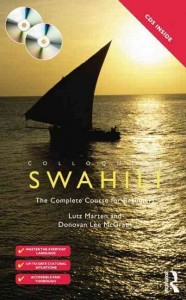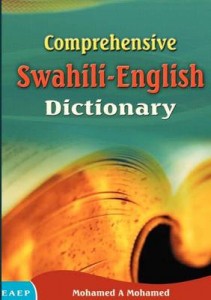by John Cooper-Poole
COLLOQUIAL SWAHILI, THE COMPLETE COURSE FOR BEGINNERS by Donovan Mcgrath and Lutz Marten. Routledge ISBN 9780415580687. p/b £24.99. Pack of book + CD £39.27. CD £24.29.
COMPREHENSIVE SWAHILI-ENGLISH DICTIONARY by Mohamed A. Mohamed. East African Educational Publishers Ltd. SLP 32737, Kijito-Nyama, Dar es Salaam. ISBN 9789966258120
There are several different kinds of foreign Swahili students. Some are the Perennial Beginners, for whom a spritely ‘jambo?’ or badly pronounced ‘habari gani?’ is about as far as interest and investment in the language ever goes. Others are the Swahili Tourists, for whom Swahili learning revolves around a holiday or short visit to East Africa, and focuses on tourist-friendly phrases such as, ‘What time is the next ferry to Zanzibar?’, or, ‘Excuse me, do you know the way to Uhuru Peak?’
Then there are the Swahili Long-Termers – the volunteers, missionaries, NGO workers and private business reps – who take the language on with varying degrees of gusto and success. In the weeks before first travelling to East Africa, the Long-Termer invariably does online research, investing in a beginner course in Swahili, and embarking on the long journey towards the ultimate goal of language fluency. On arrival in-country, the Long-Termer joins one of the many Swahili language schools, brim-full of other newly arrived long-termers, all eagerly beavering away at their verb tense markers and noun classes.
As the months go by, the Long-Termers enthusiasm begins to diminish, and they start dropping off and fading away from their fluency dream. The majority end up wistfully remembering their eager-beaver days, when they still had a language lust, now long since extinguished and excused by ‘not having enough time’, or ‘everyone at work speaks English anyway’. The few who last the course are now to be found in bars and cafés reading the Swahili newspapers whilst chatting with their Tanzanian friends. The language lust is alive and well with these trusty few.
And then there are the Kiswahili Scholars. These are the university students, who read and write Swahili poetry for pleasure, and can expound ad infinitum on subjects like the locative copulas of -ko, -po and –mo. These serious exponents of all-things-Swahili worship at the altar of the greatest Kiswahili dictionary of them all: the 1981 ‘Kamusi ya Kiswahili Sanifu’ by the Institute of Kiswahili Research at the University of Dar-es-Salaam. No Kiswahili Scholar’s satchel is complete without their battered and dog-eared copy inside.
Well, now there are two new(ish) books out there, vying to earn their own place in the hearts of the Swahili language learner, whether Perennial Beginner, Swahili Tourist, Long Termer, or Kiswahili Scholar (you know which one you are).
First up is ‘Colloquial Swahili: The Complete Course for Beginners’ by Donovan McGrath and Lutz Marten, a step-by-step language course designed for self-study or classroom use. The course is built around 14 units, each based on three dialogues on the accompanying CDs. The dialogues are designed to describe situations from everyday Swahili life (introducing yourself, telling the time, going to a wedding, buying food from the window of a bus, and the like), whilst introducing the vocabulary and structures needed to talk about them.
It is a very well thought-out and structured book, and smoothly guides the learner through a lot of otherwise complex and unwieldy grammatical constructs. This is high praise indeed, especially considering the number of less logical and non-userfriendly Swahili language courses on the market. This makes ‘Colloquial Swahili’ a great choice of language course, whether you are a Perennial Beginner, Swahili Tourist, Long-Termer, or Scholar. ‘Colloquial Swahili’ is currently the standard textbook for First Year Swahili students at the School of Oriental and African Studies (SOAS) , the pantheon of Swahili learning in the UK. If it works for them, then it can surely work for you.
‘Colloquial Swahili’ is better suited as a classroom course than for self-study. The secret of the success of any beginner’s course is hooking the student early enough. If the learner can get past the first few units or chapters, then they are far more likely to last the course. ‘Colloquial Swahili’ jumps headlong into the deep-end of business in Unit One, with roughly 50 words of vocabulary and instructions on how to use the possessive pronoun. There is a danger that many readers are going to drop out too early. In the hands of a good teacher, however, the book comes alive for the Swahili learner. Don’t fall by the wayside like those poor Long-Termers, not lasting the course.
The ‘Comprehensive Swahili-English Dictionary’ by Professor Mohamed A. Mohamed is published by East African Educational Publishers. With over 60,000 entries (it is indeed a weighty tome), Professor Mohamed’s dictionary describes itself as offering ‘the most current use of the language among Swahili speakers today’ and that it mainly targets a bilingual audience. I can vouch for this last point, for when I looked up the word ‘panda’ (whose many meanings include: climb, grow, fork, increase in number and bet), the first word that came back at me was ‘bifurcation’. I then had to reach for an English dictionary to find out what ‘bifurcation’ meant (hint: it’s to do with the fork).
The problem with any Swahili-English dictionary is that it will always be compared with the great ‘Standard Swahili-English Dictionary’ by Johnson, the Grand-Daddy of Swahili dictionaries and now more than 70 years old. One of the great things for me about Johnson’s dictionary is the way it lists multiple words according to their root verb. Hence the entry for the verb –chunga (meaning ‘to herd’, or ‘take care of’) includes other verbs derived from the root verb such as –chunguza (‘to investigate’), and –chungulia (‘to watch closely’). In Professor Mohamed’s dictionary, though, these words take separate entries, and I can’t help feeling that I preferred it in the old Johnson way.
Another minor niggle is that despite being a modern dictionary (published in 2011), it doesn’t contain enough modern Swahili words. Sure, plenty of new words appear, especially relating to science and technology. But there is a distinct lack of the enormous number of words entering the Kiswahili lexicon via slang and popular culture. A modern dictionary needs to capture the vibrancy of modern street Swahili if it is to be truly modern.
But I think I am just bifurcating hairs here. Professor Mohamed’s comprehensive dictionary adds much value to the study of Kiswahili language, and will be a welcome addition and trusty friend to all Swahili students. It is the best Swahili-English dictionary I have seen apart from Johnson’s classic.
So, whether you are a Perennial Beginner, Swahili Tourist, Long-Termer or Kiswahili Scholar, there is plenty for all of you in ‘Colloquial Swahili’ and the ‘Comprehensive Swahili-English Dictionary’. To keep that dream of Kiswahili fluency alive, you could do much worse than get yourselves copies of both of these valuable books, and jump right on in. As the Waswahili say, ‘Mwenye macho haambiwi tazama’ -‘someone with eyes does not need to be told to look’.
Jimmy Innes
THIRD MAN IN HAVANA, by Tom Rodwell. Corinthian Books, London, 2012. xvii + 286 pages. Hardback £14.99.
With the sub-title ‘Finding the heart of cricket in the world’s most unlikely places’, the current chairman, of The Lord’s Taverners has written an uplifting series of tales of bringing cricket to many of the world’s disadvantaged people. It started, almost by accident, in India and then progressed through Cuba, USA, Panama, Sri Lanka and Israel before taking on challenges across Africa.
Tom Rodwell and his small coaching team developed contacts at the highest levels and thus received meaningful sponsorship and the authority to help blind (either totally or partially) and otherwise disabled children in Tanzania. As part of their East African Disability Cricket Programme, the team carried out their work at the University of Dar es Salaam, where they were ably supported by the Tanzanian national side. There were two noteworthy postscripts to that work: the great progress of the disabled children at Morogoro, thanks to a member of the Morogoro Teachers College who attended the sessions at the University; and the introduction by the author of the Tanzanian national cricketers to the club scene in England. An entertaining and heartening book, with chapters on Uganda, Rwanda and Sierra Leone as well. If only there were more people like Tom Rodwell in the world ….
David Kelly
MY LIFE by Paul von Lettow-Vorbeck: translated from the German by James Pierce, published by Rilling Enterprises, 5307 Loves Park, Illinois USA 2012. ISBN-13:978-0-615547-28-2
Colonel Paul von Lettow-Vorbeck famously commanded the Schutztruppe (roughly equivalent to the King’s African Rifles) in German East Africa throughout the 1914-18 War. His definitive account of that war was published as Memories of East Africa in 1919. This autobiography, written when he was 87, sets the African campaign in the broader context of his long life.
Von Lettow begins with a detailed account of his family history, Prussia’s ruthless expansion in the nineteenth century and his early military career. A spell of duty in German Southwest Africa (now Namibia) during the Herero revolt was a useful preparation for his posting to East Africa. He defied the Governor (Schnee), who wanted to declare the colony neutral, and won a surprise victory over a larger British force at Tanga. He continued fighting against heavy odds until a fortnight after the 1918 Armistice. His summary of the campaign is more selective than his 1919 account, but he adds details from his post-war conversations with Field Marshal Smuts and other British commanders.
He returned to Germany as an undefeated general and was given a hero’s welcome. However, things did not run smoothly for him. Germany in 1919 was in turmoil and he was dismissed from the army. Inflation eroded his pension and he had to work as a sales manager to make ends meet. In 1928 he was elected to the Reichstag for the German National People’s Party (DNVP), but his party supported Hitler’s appointment as Chancellor and the Nazis took control.
To his credit, von Lettow chose to leave public life rather than join the Nazi party, but he was impressed with the ‘Prussian spirit’ of the Nazis and writes: ‘conditions in the concentration camps were not known to the public and the attacks on the Jews were, at least in part, believed to be justified.’ Even though he was unimpressed by Hitler at their one meeting, he admits that ’Hitler did tremendous things for Germany.’ When invited to join a plot against Hitler in 1944, he declined – partly because he believed that Hitler had a secret weapon which would win the war.
The 1939-45 War was disastrous for von Lettow –his two sons were killed in action and his home in Bremen was destroyed by bombing. But he retained his Prussian spirit and complains about the ‘English’ military occupation force for not allowing him to retain his car and his hunting rifles. In the chapter on his farewell tour of Africa in 1956,his comments on the prospects for African independence reflect contemporary right-wing opinion but now seem very dated, if not racist.
Von Lettow was not the only German officer to be initially sympathetic to the Nazis, nor was he the only writer in the 1950s who believed colonial rule would continue for many years. Whatever errors of judgement are revealed in this autobiography, he will always be remembered for his exploits in the 1914-18 war, and above all for his ability to win the respect and loyalty of his African troops.
John Sankey


